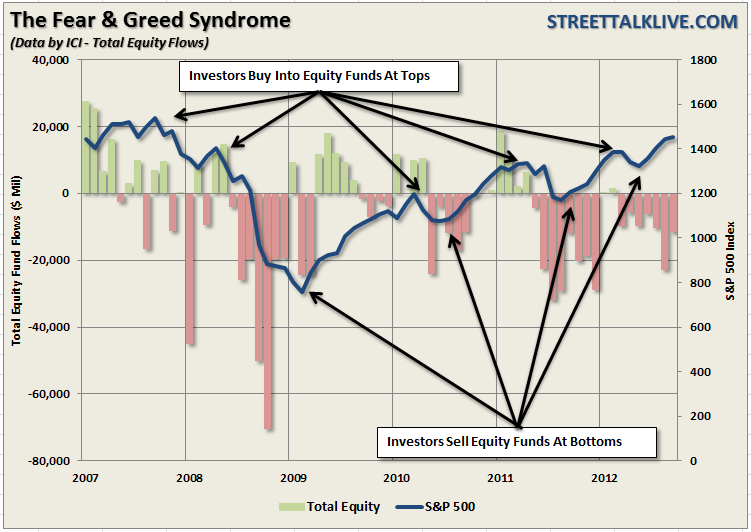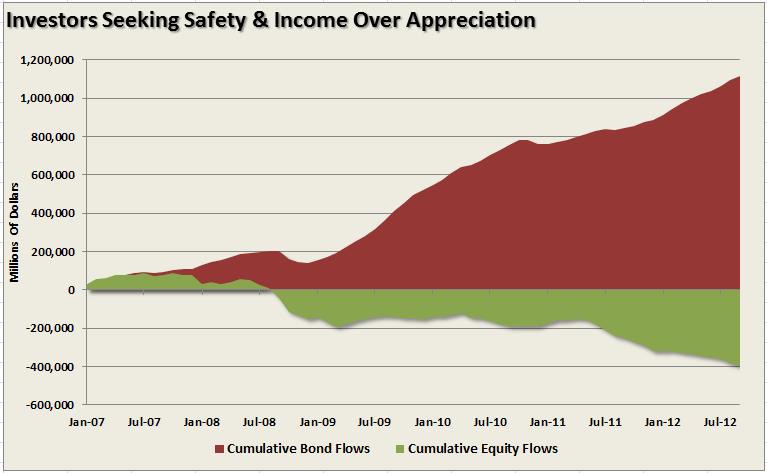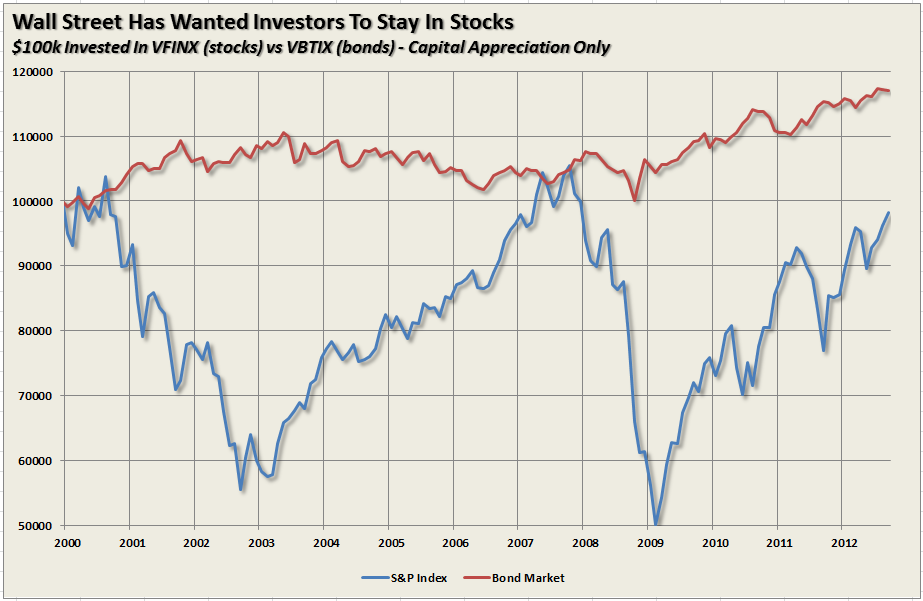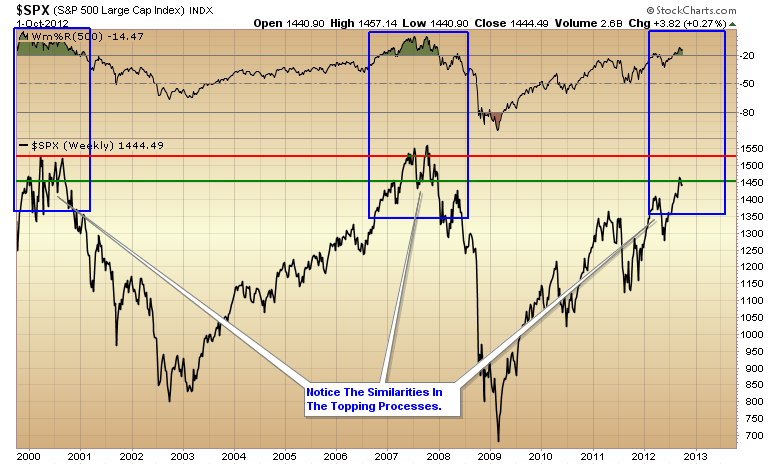In late February, 2012 I wrote "Media Headlines Will Lead You To Ruin" wherein I discussed that the media, like investors, are the most bullish at the top, and conversely the most bearish at the bottom, of markets. This is why investors, who are consistently inundated with the continual drone of "experts" through the daily media outlets are often led astray from logical, and critical, investment processes and decision making.
We stated at the time:
Investors, on the whole, have a tendency to do exactly the opposite of what they should do when it comes to investing - 'Buy High and Sell Low.' The reality is that the emotions of greed and fear do more to cause investors to lose money in the market than being robbed at the point of a gun.
 Take a look at the chart of the data from ICI who tracks flows of money into and out of mutual funds [updated through 9/15/12]. When markets are correcting investors panic and sell out of stocks with the majority of the selling occurring near the lows of the market. As the markets rally - investors continue to sell as they disbelieve the rise initially and are just happy to be getting some of their money back. However, as the rally continues to advance from oversold conditions - investors are 'lured' back into the water as memories of the past pain fades and the 'greed factor' overtakes their logic. Unfortunately, this buying always tends to occur at, or near, market peaks.
Take a look at the chart of the data from ICI who tracks flows of money into and out of mutual funds [updated through 9/15/12]. When markets are correcting investors panic and sell out of stocks with the majority of the selling occurring near the lows of the market. As the markets rally - investors continue to sell as they disbelieve the rise initially and are just happy to be getting some of their money back. However, as the rally continues to advance from oversold conditions - investors are 'lured' back into the water as memories of the past pain fades and the 'greed factor' overtakes their logic. Unfortunately, this buying always tends to occur at, or near, market peaks.
By simply looking at the history of investor behavior it is evident that emotions rule their investment decisions. Retail investors continually chase whatever investment strategy was working in the past hoping to catch the "hot hand." Unfortunately, by the time a particular investment strategy gains wide public attention (momentum, value, growth) that particular market trend is generally close to its end. As one failed experiment follows the next - the investor finally just liquidates to stop the bleeding. But can you really blame them?
Every day the media spins one financial headline after the next reporting the news of the moment. The problem is that headline news, while it may be interesting to read, rarely has much to do with portfolio management and investing. However, the continued push of commentary drives investors to make emotional, rather than logical, investment decisions.
A recent Reuter's article written by Jilian Mincer and Steven Johnson entitled "Mom and Pop Investors Miss Out On Stock Market Gains" shows the disconnect between Wall Street, the media and the retail investor. The article states:
"Stocks have more than doubled since the financial crisis and are closing in on a five-year high, but many Main Street investors have been absent from the party - especially those with the least saved. Those who missed much of the rally did so because they reduced equity exposure after the benchmark S&P 500 index plummeted 57 percent between late 2007 and March 2009, according to an analysis by Reuters of mutual fund flows and changes in assets held in retirement accounts. Investors with the smallest savings typically saw the lowest percentage recovery in returns. And while some have returned to the stock market during the subsequent rally, plenty of small investors remain on the sidelines."
Let's see, after a 12-year secular bear market, two 50%+ market declines, corporate and financial corruption and scandals, a housing bust and soaring unemployment, it might just be possible that investors are catching on the preservation of their hard earned savings is more important than gambling at the Wall Street casino. However, for Wall Street, this is a much bigger issue because without the retail investor the mutual fund business runs into trouble.
Yes, many investors have chosen to remain on the sidelines, after suffering brutal losses since the turn of the century, missing the recovery from the 2009 lows. What the article doesn't address is WHY?
Why did they sell at the bottom?
Retail investors are not a sophisticated bunch of traders sitting behind screens all day watching each tick of their money. For the most part they are working men, and women, who have been pulled into arguably the most complicated casino game on the planet with little more than rudimentary education about what they are doing or why. These individuals invest for no other reason than this is what they have been instructed to do. Over the last 25 years the media has been flooded with do-it-yourself, get rich quick, investing programs that work great as long as the market rises. Of course, when the downturn comes, and causes real losses of real capital, the game isn't nearly as fun. The old saying that you should "buy when there is blood in the streets" is assuming that it wasn't your blood to begin with.
Why do investors sell at the bottom? It is generally because the media instructs them to "hold on" all the way down. Wall Street never tells them to raise some cash, rotate into fixed income or reduce equity risk in portfolios. Finally, when the pain of loss becomes overwhelming, investors finally capitulate to maintain whatever scrap of savings they have left.
Why did they not buy back in?
Of course, when the market eventually bounces back the media then chastises these same individuals for not jumping in right at the bottom. Articles, such as the one published by Reuters, which point fingers at these poor individuals for not being in the markets during the run up - had likewise kept them invested all the way down.
The article stated: "Investors who left the market at the end of 2008 or early 2009, paid a high price." While it may be true that individuals missed the equity run up, investors have been investing, just not in the stock market. The flow of money into bonds, and bond funds, have soared as investors, many of which are baby boomers heading rapidly towards retirement, have opted for safety of their remaining principal over taking speculative market risk. These individuals are beginning to realize that "time" is NOT on their side as more than a decade has now slipped by with less to show for it. 
While the standard line from Wall Street now is that you have to be invested in stocks to outpace inflation - history shows that a person invested in 100% fixed income over the last 12 years has not only preserved principal but grossly outpaced the equity market. While inflation may eventually be a problem - it will likely not be in the near term as long as Central Banks continue to artificially keep interest rates at low levels keeping the deflationary cycle in tact. 
For Main Street America it is no longer about chasing the market to try and get rich quick. A hard lesson in the fundamental reality of mean reversions has been a brutal teacher of the term "risk." It is interesting that after more than a 100% recovery from the recession lows articles taunting individuals for not being invested in the stock market are being written. Should not responsible journalist be looking at data and suggesting that maybe this particular rally had been missed and investors should be waiting for a better opportunity in the future? Or at least remaining more conservative in their portfolio allocation to reduce "risk?"
The chart below is a simple measure of over bought and over sold market conditions since 2000. 
The market today is as overbought as it has been at the peak of the last two market cycles. It is quite apparent that investors should at least be thinking about the potential of the next mean reversion is likely to occur. However, blending this technical look with the deteriorating economic and fundamental drivers of the market elevates the risk of chasing the equity market here even more precarious.
The concern today is that investors are likely not to return to the stock market casino any time soon - this is bad news for Wall Street as bonuses will have to be cut, employees will have to be laid off and profits will be lower. However, not unlike the after effects of the "Great Depression", there were many investors that never returned to the financial market due to the deep mistrust that Wall Street built between themselves and the retail investor. That mistrust took almost 40 years to repair. It will likely take much longer than the last three years to repair it this time as well.
Have investors missed this rally? Obviously. However, there will be other opportunities in the future with far less risk and a greater potential return than exists today. What consistently eludes the Wall Street media machine is that in order for the retail investor to be a buyer when there is "blood in the streets" they had to be a seller when there was "greed in the streets." Where was that article?
- English (UK)
- English (India)
- English (Canada)
- English (Australia)
- English (South Africa)
- English (Philippines)
- English (Nigeria)
- Deutsch
- Español (España)
- Español (México)
- Français
- Italiano
- Nederlands
- Português (Portugal)
- Polski
- Português (Brasil)
- Русский
- Türkçe
- العربية
- Ελληνικά
- Svenska
- Suomi
- עברית
- 日本語
- 한국어
- 简体中文
- 繁體中文
- Bahasa Indonesia
- Bahasa Melayu
- ไทย
- Tiếng Việt
- हिंदी
Have Investors Really Missed Anything?
Published 10/02/2012, 02:09 AM
Updated 02/15/2024, 03:10 AM
Have Investors Really Missed Anything?
3rd party Ad. Not an offer or recommendation by Investing.com. See disclosure here or
remove ads
.
Latest comments
Install Our App
Risk Disclosure: Trading in financial instruments and/or cryptocurrencies involves high risks including the risk of losing some, or all, of your investment amount, and may not be suitable for all investors. Prices of cryptocurrencies are extremely volatile and may be affected by external factors such as financial, regulatory or political events. Trading on margin increases the financial risks.
Before deciding to trade in financial instrument or cryptocurrencies you should be fully informed of the risks and costs associated with trading the financial markets, carefully consider your investment objectives, level of experience, and risk appetite, and seek professional advice where needed.
Fusion Media would like to remind you that the data contained in this website is not necessarily real-time nor accurate. The data and prices on the website are not necessarily provided by any market or exchange, but may be provided by market makers, and so prices may not be accurate and may differ from the actual price at any given market, meaning prices are indicative and not appropriate for trading purposes. Fusion Media and any provider of the data contained in this website will not accept liability for any loss or damage as a result of your trading, or your reliance on the information contained within this website.
It is prohibited to use, store, reproduce, display, modify, transmit or distribute the data contained in this website without the explicit prior written permission of Fusion Media and/or the data provider. All intellectual property rights are reserved by the providers and/or the exchange providing the data contained in this website.
Fusion Media may be compensated by the advertisers that appear on the website, based on your interaction with the advertisements or advertisers.
Before deciding to trade in financial instrument or cryptocurrencies you should be fully informed of the risks and costs associated with trading the financial markets, carefully consider your investment objectives, level of experience, and risk appetite, and seek professional advice where needed.
Fusion Media would like to remind you that the data contained in this website is not necessarily real-time nor accurate. The data and prices on the website are not necessarily provided by any market or exchange, but may be provided by market makers, and so prices may not be accurate and may differ from the actual price at any given market, meaning prices are indicative and not appropriate for trading purposes. Fusion Media and any provider of the data contained in this website will not accept liability for any loss or damage as a result of your trading, or your reliance on the information contained within this website.
It is prohibited to use, store, reproduce, display, modify, transmit or distribute the data contained in this website without the explicit prior written permission of Fusion Media and/or the data provider. All intellectual property rights are reserved by the providers and/or the exchange providing the data contained in this website.
Fusion Media may be compensated by the advertisers that appear on the website, based on your interaction with the advertisements or advertisers.
© 2007-2024 - Fusion Media Limited. All Rights Reserved.
